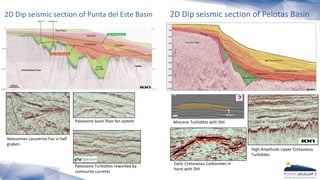Offshore Drilling In Uruguay: The Search For Black Gold And Its Challenges

Table of Contents
Uruguay's Offshore Oil and Gas Potential
The geological formations beneath Uruguay's Atlantic waters hold the promise of substantial oil and gas reserves. The most promising area is the Punta del Este Basin, an offshore basin exhibiting characteristics similar to those found in productive regions elsewhere in South America. Exploration activities, while still in their relatively early stages, have already yielded encouraging results, suggesting the presence of significant hydrocarbon deposits. The potential economic impact of successful offshore drilling in Uruguay is considerable, potentially transforming the nation's energy landscape and bolstering its economy. The estimated reserves, while still uncertain, hold the potential to significantly reduce Uruguay's reliance on energy imports and generate substantial revenue for the government.
- Exploration licenses awarded: Several international companies have already secured exploration licenses in promising areas.
- Seismic surveys conducted: Extensive seismic surveys have been carried out to map the subsurface geology and identify potential reservoir formations.
- Types of hydrocarbons expected: Initial findings suggest the presence of both oil and natural gas, with the potential for significant gas discoveries.
- Potential for gas discoveries: The discovery of substantial natural gas reserves could have a transformative effect on Uruguay's energy independence.
The Regulatory Framework and Licensing Processes for Offshore Drilling in Uruguay
Uruguay's government has established a regulatory framework to govern offshore oil and gas exploration and production, balancing economic incentives with environmental protection. The licensing process for international companies is transparent and adheres to international best practices. While encouraging foreign investment, the government emphasizes stringent environmental regulations and rigorous impact assessments. Several government agencies play crucial roles in overseeing the entire process, from licensing to environmental monitoring. Attracting investment in this high-risk industry also involves offering competitive tax incentives.
- Key environmental regulations: Stringent environmental regulations are in place to minimize the environmental impact of offshore drilling operations.
- Process for obtaining exploration licenses: A transparent and competitive bidding process governs the awarding of exploration licenses.
- Government agencies involved: The Ministry of Industry, Energy and Mining plays a central role in regulating the industry.
- Tax incentives for investors: Tax benefits and other incentives are offered to attract foreign investment.
Technological Challenges and Innovations in Uruguayan Offshore Drilling
Offshore drilling in Uruguay presents unique technological challenges. The water depths, seabed conditions, and potentially harsh weather conditions demand the use of specialized equipment and advanced techniques. To mitigate risks and maximize efficiency, companies utilize innovative technologies, including advanced drilling rigs, subsea production systems, and real-time monitoring systems. These technological advancements are crucial for safe and environmentally responsible operations.
- Water depths and challenges: Varying water depths necessitate the use of different drilling rigs and technologies.
- Types of drilling rigs used: Advanced drilling rigs capable of operating in deep waters are essential for this endeavor.
- Environmental monitoring technologies: Real-time monitoring systems are vital for detecting and responding to potential environmental issues.
- Subsea production systems: These technologies enable the efficient extraction of hydrocarbons from underwater reservoirs.
Environmental Concerns and Mitigation Strategies in Uruguayan Offshore Drilling
The potential environmental impacts of offshore drilling in Uruguay, such as oil spills and habitat disruption, are significant concerns. Rigorous environmental impact assessments (EIAs) are mandatory, and comprehensive mitigation plans must be developed and implemented by operating companies. Uruguay's commitment to sustainable energy practices necessitates the adoption of international best practices to minimize environmental risks. This includes implementing robust oil spill response plans and taking proactive measures to protect marine biodiversity.
- Potential environmental impacts: Oil spills, habitat destruction, and noise pollution are among the main environmental concerns.
- Oil spill response plans: Comprehensive plans must be in place to address potential oil spills effectively.
- Marine biodiversity protection measures: Measures to protect marine life and sensitive ecosystems are paramount.
- Carbon footprint reduction strategies: Efforts to minimize the carbon footprint of offshore drilling operations are essential.
Socioeconomic Impacts of Offshore Drilling in Uruguay
Offshore drilling in Uruguay could create numerous jobs across various sectors, from direct employment in drilling operations to support industries like logistics and manufacturing. Government revenue from royalties and taxes could significantly boost the national economy. However, potential negative social impacts, such as displacement of communities and increased pressure on infrastructure, must be carefully considered. Transparent and equitable resource management, involving local communities in the decision-making process, is crucial to ensure that the benefits are widely shared and potential negative consequences are mitigated.
- Job creation in related sectors: Significant employment opportunities will arise in various sectors linked to offshore drilling.
- Government revenue projections: Successful operations could generate substantial government revenue.
- Community engagement strategies: Open communication and collaboration with local communities are vital.
- Potential for infrastructure development: Investment in port facilities and related infrastructure is likely.
Conclusion: The Future of Offshore Drilling in Uruguay
Offshore drilling in Uruguay presents a complex scenario, offering the potential for significant economic growth but also posing significant environmental and social challenges. The success of this emerging industry hinges on a careful balance between economic development and environmental protection. Sustainable practices, transparent governance, and responsible resource management are not merely desirable but essential for ensuring that the benefits of offshore drilling in Uruguay are realized while mitigating potential risks. Learn more about the potential of offshore drilling in Uruguay and its sustainable development, or contact us to explore investment opportunities.

Featured Posts
-
 Henry Golding Talks Crazy Rich Asians Sequel And Tv Series Development
May 11, 2025
Henry Golding Talks Crazy Rich Asians Sequel And Tv Series Development
May 11, 2025 -
 Shane Lowry Proud Friend Despite Mc Ilroys Masters Setback
May 11, 2025
Shane Lowry Proud Friend Despite Mc Ilroys Masters Setback
May 11, 2025 -
 The One And Only Manon Fiorots Path To Ufc Dominance After A Bellator Setback
May 11, 2025
The One And Only Manon Fiorots Path To Ufc Dominance After A Bellator Setback
May 11, 2025 -
 A Simple Path To Profitable Dividend Investing
May 11, 2025
A Simple Path To Profitable Dividend Investing
May 11, 2025 -
 New Indy Car Documentary May 18th Premiere On Fox
May 11, 2025
New Indy Car Documentary May 18th Premiere On Fox
May 11, 2025
